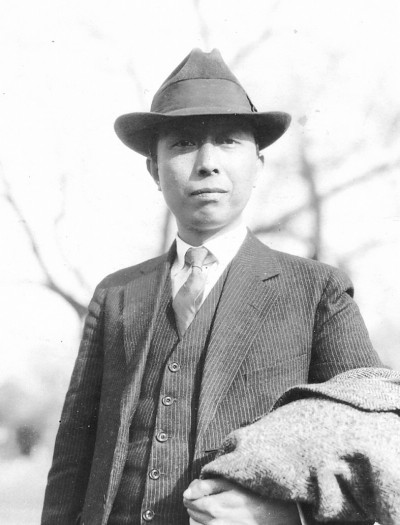|
Mandopop
Mandopop or Mandapop refers to Mandarin popular music. The genre has its origin in the jazz-influenced popular music of 1930s Shanghai known as Shidaiqu; later influences came from Japanese enka, Hong Kong's Cantopop, Taiwan's Hokkien pop, and in particular the campus folk song folk movement of the 1970s. "Mandopop" may be used as a general term to describe popular songs performed in Mandarin. Though Mandopop predates Cantopop, the English term was coined around 1980 after " Cantopop" became a popular term for describing popular songs in Cantonese. "Mandopop" was used to describe Mandarin-language popular songs of that time, some of which were versions of Cantopop songs sung by the same singers with different lyrics to suit the different rhyme and tonal patterns of Mandarin. Mandopop is categorized as a subgenre of commercial Chinese-language music within C-pop. Popular music sung in Mandarin was the first variety of popular music in Chinese to establish itself as a v ... [...More Info...] [...Related Items...] OR: [Wikipedia] [Google] [Baidu] |
C-pop
C-pop is an abbreviation for Chinese popular music (), a loosely defined musical genre by artists originating from mainland China, Hong Kong and Taiwan (the Greater China region). This also includes countries where Sinitic languages, Chinese languages are used by parts of the population, such as Singapore and Malaysia. C-pop is used as an umbrella term covering not only Chinese pop but also rhythm and blues, R&B, Sentimental ballad, ballads, Chinese rock, Chinese hip hop and Chinese ambient music, although Chinese rock diverged during the early 1990s. There are currently three main subgenres within C-pop: Cantopop, Mandopop and Hokkien pop. The gap between Cantopop and Mandopop has been narrowing in the new millennium. Hokkien pop, initially strongly influenced by Japanese enka, has been re-integrating into C-pop and narrowing its trend of development towards Mandopop. Chinese popular music in China was initially a vehicle for the Cultural Revolution and Maoism, Maoist ideolo ... [...More Info...] [...Related Items...] OR: [Wikipedia] [Google] [Baidu] |
Cantopop
Cantopop (a contraction of "Cantonese pop music") is a genre of pop music sung in Cantonese. Cantopop is also used to refer to the cultural context of its production and consumption. The genre began in the 1970s and became associated with Hong Kong popular music from the middle of the decade. Cantopop then reached its height of popularity in the 1980s and 1990s before slowly declining in the 2000s and shrinking in the 2010s. The term "Cantopop" itself was coined in 1978 after "Cantorock", a term first used in 1974. In the 1980s, Cantopop reached its highest glory with fanbase and concerts all over the world, especially in Macau, Mainland China, Taiwan, Singapore, Malaysia, South Korea, and Japan. This was even more obvious with the influx of songs from Hong Kong movies during the time. Besides Western pop music, Cantopop is also influenced by other international genres, including jazz, rock and roll, R&B, disco, electronic, ballad and others. Cantopop songs are almost inva ... [...More Info...] [...Related Items...] OR: [Wikipedia] [Google] [Baidu] |
Music Of Taiwan
The music of Taiwan reflects the diverse culture of Taiwanese people. Taiwan has undergone several economic, social, and political changes through its cultural history, and Taiwanese music reflects those issues in its way. The music of the country has adopted a mixed style. As a country rich in Chinese folk culture and with many indigenous tribes with their own distinct artistic identity, various folk music styles are appreciated in Taiwan. In addition, people in Taiwan highly appreciate various style of Western classical music and pop music. Taiwan is a major Mandopop hub. Background The Kuomintang-led Republic of China government arrived in Taiwan in 1949, a government that suppressed native Taiwanese culture and implemented Standard Chinese (Mandarin) as the official language. This political event has significant effects on the development of music in Taiwan in the 20th century as it resulted in a gap in the transition of the traditional music culture. In 1987, a revival ... [...More Info...] [...Related Items...] OR: [Wikipedia] [Google] [Baidu] |
Hokkien Pop
Hokkien pop, also known as Taiwanese Hokkien popular music, Taiwanese pop (), T-pop (), Tai-pop, Minnan Pop and Taiwanese folk (), is a popular music genre sung in Hokkien, especially Taiwanese Hokkien and produced mainly in Taiwan and sometimes in Fujian in Mainland China or Hong Kong or even Singapore in Southeast Asia. Hokkien pop is most popular amongst Hoklo people in Taiwan, Mainland China, Hong Kong, and the Overseas Chinese and Overseas Taiwanese in Southeast Asia, such as Chinese Singaporeans, Chinese Malaysians, Chinese Filipinos, Chinese Indonesians, etc. Terminology The historical origin of Hokkien pop comes from a Japanese enka base instead of a Chinese shidaiqu base. Because it developed from traditional Japanese enka, it has become diverse in its varieties. History Origin Under Japanese rule (1895–1945), Taiwanese music continued and developed its new form from the previous period. By the 1930s, vinyl records of traditional music, such as Taiwanese opera, ... [...More Info...] [...Related Items...] OR: [Wikipedia] [Google] [Baidu] |
Taiwan
Taiwan, officially the Republic of China (ROC), is a country in East Asia. The main geography of Taiwan, island of Taiwan, also known as ''Formosa'', lies between the East China Sea, East and South China Seas in the northwestern Pacific Ocean, with the China, People's Republic of China (PRC) to the northwest, Japan to the northeast, and the Philippines to the south. It has an area of , with mountain ranges dominating the eastern two-thirds and plains in the western third, where its Urbanization by country, highly urbanized population is concentrated. The combined Free area of the Republic of China, territories under ROC control consist of list of islands of Taiwan, 168 islands in total covering . The Taipei–Keelung metropolitan area, largest metropolitan area is formed by Taipei (the capital), New Taipei City, and Keelung. With around 23.9 million inhabitants, Taiwan is among the List of countries and dependencies by population density, most densely populated countries. Tai ... [...More Info...] [...Related Items...] OR: [Wikipedia] [Google] [Baidu] |
Taipei
, nickname = The City of Azaleas , image_map = , map_caption = , pushpin_map = Taiwan#Asia#Pacific Ocean#Earth , coordinates = , subdivision_type = Country , subdivision_name = Taiwan , established_title = Settled , established_date = 1709 , established_title1 = Renamed Taihoku , established_date1 = 17 April 1895 , established_title2 = Provincial city (Taiwan), Provincial city status , established_date2 = 25 October 1945 , established_title3 = Retreat of the government of the Republic of China to Taiwan, Provisional national capital , established_date3 = 7 December 1949 , established_title4 = Reconstituted as a Yuan-controlled municipality , established_date4 = 1 July 1967 , capital_type = City seat , capital = Xinyi District, Taipei, Xinyi District , largest_settlement ... [...More Info...] [...Related Items...] OR: [Wikipedia] [Google] [Baidu] |
Shidaiqu
Shidaiqu () is a type of Chinese popular music that is a fusion of Chinese folk, American jazz and Hollywood film music that originated in Shanghai in the 1920s.Shoesmith, Brian. Rossiter, Ned. 004(2004). Refashioning Pop Music in Asia: Cosmopolitan flows, political tempos and aesthetic Industries. Routeledge Publishing. Terminology The term literally translates to 'songs of the era' in Mandarin Chinese. When sung in Cantonese, it is commonly referred to as ; in Amoy Hokkien, it is known as . These terms incorporate the native names for the dialects. The term is believed to have originated in Hong Kong to describe a genre of popular Chinese music that gained prominence in Shanghai during the early to mid-20th century. This genre emerged as a fusion of traditional Chinese melodies, Western musical elements, and influences from jazz and popular music of the time. Musicality Shidaiqu is a kind of fusion music that makes use of jazz musical instruments (castanets, maracas ... [...More Info...] [...Related Items...] OR: [Wikipedia] [Google] [Baidu] |
Chinese Rock
Chinese rock ( zh, s=中国摇滚 , p=Zhōngguó yáogǔn; also zh, s=wikt:中国, 中国wikt:摇滚音乐, 摇滚音乐 , t=中國搖滾音樂 , p=Zhōngguó yáogǔn yīnyuè, lit. "Chinese rock and roll music") is a wide variety of rock and roll music made by rock bands and solo artists from Mainland China (other regions such as Taiwan, Hong Kong, Macau are considered separate scenes). Rock music as an independent music genre first appeared in China in the 1980s, during the age of New Enlightenment (China), New Enlightenment. Typically, Chinese rock is described as an anti-traditional instrument, a music that defies mainstream ideology, commercial establishment, and cultural hegemony. Chinese rock is a fusion of forms integrating Western popular music and Guoyue, traditional Chinese music. History The Northwest Wind (1980s) Rock music did not take hold in Mainland China until the end of the Cultural Revolution and the onset of the Reform and Opening. Peking All-Stars were ... [...More Info...] [...Related Items...] OR: [Wikipedia] [Google] [Baidu] |
J-pop
J-pop (often stylized in all caps; an abbreviated form of "Japanese popular music"), natively known simply as , is the name for a form of popular music that entered the musical mainstream of Japan in the 1990s. Modern J-pop has its roots in traditional music of Japan, and significantly in 1960s in music, 1960s pop music, pop and rock music. J-pop replaced ''kayōkyoku'' ("Lyric Singing Music"), a term for Japanese popular music from the 1920s to the 1980s in the Japanese music scene. Japanese rock bands such as Happy End (band), Happy End fused the Beatles and Beach Boys-style rock with Japanese music in the 1960s1970s. J-pop was further defined by New wave music, new wave and Crossover music, crossover Jazz fusion, fusion acts of the late 1970s, such as Yellow Magic Orchestra and Southern All Stars. () Popular styles of Japanese pop music include city pop and technopop during the 1970s1980s, and Eurobeat#J-Euro, J-Euro (such as Namie Amuro) and Shibuya-kei during the 1990s and 2 ... [...More Info...] [...Related Items...] OR: [Wikipedia] [Google] [Baidu] |
Standard Chinese
Standard Chinese ( zh, s=现代标准汉语, t=現代標準漢語, p=Xiàndài biāozhǔn hànyǔ, l=modern standard Han speech) is a modern standard form of Mandarin Chinese that was first codified during the republican era (1912–1949). It is designated as the official language of mainland China and a major language in the United Nations, Singapore, and Taiwan. It is largely based on the Beijing dialect. Standard Chinese is a pluricentric language with local standards in mainland China, Taiwan and Singapore that mainly differ in their lexicon. Hong Kong written Chinese, used for formal written communication in Hong Kong and Macau, is a form of Standard Chinese that is read aloud with the Cantonese reading of characters. Like other Sinitic languages, Standard Chinese is a tonal language with topic-prominent organization and subject–verb–object (SVO) word order. Compared with southern varieties, the language has fewer vowels, final consonants and tones, but more ... [...More Info...] [...Related Items...] OR: [Wikipedia] [Google] [Baidu] |
Republic Of China (1912–1949)
The Republic of China (ROC) began on 1 January 1912 as a sovereign state in mainland China following the 1911 Revolution, which overthrew the Manchu people, Manchu-led Qing dynasty and ended China's imperial China, imperial history. From 1927, the Kuomintang (KMT) Northern expedition, reunified the country and initially ruled it as a one-party state with Nanjing as the national capital. In 1949, Nationalist government, the KMT-led government was defeated in the Chinese Civil War and lost control of the mainland to the Chinese Communist Party (CCP). The CCP Proclamation of the People's Republic of China, established the People's Republic of China (PRC) while the ROC was forced to Retreat of the government of the Republic of China to Taiwan, retreat to Taiwan; the ROC retains control over the Taiwan Area, and political status of Taiwan, its political status remains disputed. The ROC is recorded as a founding member of both the League of Nations and the United Nations, and previous ... [...More Info...] [...Related Items...] OR: [Wikipedia] [Google] [Baidu] |
Genre
Genre () is any style or form of communication in any mode (written, spoken, digital, artistic, etc.) with socially agreed-upon conventions developed over time. In popular usage, it normally describes a category of literature, music, or other forms of art or entertainment, based on some set of stylistic criteria, as in literary genres, film genres, music genres, comics genres, etc. Often, works fit into multiple genres by way of borrowing and recombining these conventions. Stand-alone texts, works, or pieces of communication may have individual styles, but genres are amalgams of these texts based on agreed-upon or socially inferred conventions. Some genres may have rigid, strictly adhered-to guidelines, while others may show great flexibility. The proper use of a specific genre is important for a successful transfer of information ( media-adequacy). Critical discussion of genre perhaps began with a classification system for ancient Greek literature, as set out in Aristotle' ... [...More Info...] [...Related Items...] OR: [Wikipedia] [Google] [Baidu] |







